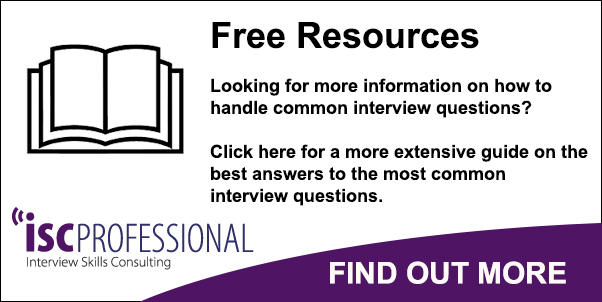Common Interview Questions and Example Answers for UK Interviews
Congratulations, you made the shortlist! You are now most likely up against three to five competitors, all after the same job. But what interview questions can you expect to come up, and what is the best way to answer?
The Interview is where you really have to perform, so we have shortlisted some of the most common interview questions and answers you will come across in the UK.
Some of the more traditional questions are probably more important. These are the ones where they will be directly comparing you to the competition and making judgements about how well you fit the company and the role.

Here are a couple of commonly used examples and how we recommend you answer them:
Tell me about yourself…
9 out of 10 times this will be the first question you are asked. There is a trick here, as the employer really wants to know more about you, but this is a chemistry question. What they are really asking is “do I like you?” and “are you the kind of person we want working here?”
What they are not after, is your life story, keep your answer very focussed on the present and the future. Briefly cover your education, mention previous roles that you have had and focus on those that make you a good candidate.
What are your weaknesses?
This question catches many out. The first part of answering this question is realising that you have weaknesses. Everyone has weaknesses or things that they can improve on. What the interviewer wants here is to see how honest, and self -aware you are.
Think about this in advance, be honest with yourself about your previous work performance and identify something you would like to work on and improve. Mention that weakness and state how you have worked to overcome it.
Do you think you will be successful in this role?
Sometimes candidates think that this is an invitation to boast. That would be a mistake. What they are asking is whether you are able to align your strengths to the needs of the job. Rather than telling the interviewer how great you are, you need to give a detailed answer explaining how you are specifically suited to this job and why you think that the role is the best fit for you and them.
This is where your employer research will pay off again. a strong understanding of the role will make it possible for you to give a great answer here. It also helps if you can make an application of your extra-curricular interests. Employers respond well when candidates really seem passionate about their work.
What are your salary expectations?
It is important to be honest and confident when asking for a salary. Expect the employer to have a number in mind already and you should too. You must be aware of the market value of someone with your skills. You need to be honest with yourself here, are you worth more because you have a wealth of experience or are you the bargain option, someone who wants to grow into the role and compensate for experience with enthusiasm.
Let the employer know what your target salary is, they may see this as a starting point for negotiation but only you know for sure what you can happily accept.
Do you have any questions for us?
The answer is always yes. If you don’t have any questions here, it will end the interview on a real downer. An intelligent question about the recruitment process can open the door for a little informal chat that’s great for chemistry and making a lasting impression. Alway remember to thank them for their time and let them know that you are looking forward to speaking to them again.
For more examples of common interview questions, click below to read our more extensive guide on some more common interview questions you’re likely to come across.





